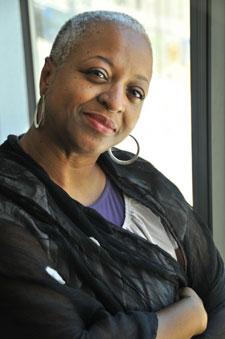Though Hazelle Palmer is still settling in as the new executive director of the AIDS Committee of Toronto (ACT) she’s already given away one of the paintings that briefly hung in her new office. In addition to having a master’s certificate in healthcare management from York and sitting on the board of Women’s College Hospital, Palmer is also an artist with a couple of gallery showings under her belt.
“They took it for an auction the other day,” she says. “It’s another way I get to contribute.”
The auction was for the 16th anniversary of Teens Educating and Confronting Homophobia (TEACH), a high-school antihomophobia program run by Planned Parenthood Toronto (PPT). Prior to joining ACT in April, Palmer was PPT’s executive director and describes her tenure as “a very successful eight years.”
Under her leadership PPT unveiled an ambitious five-year strategic plan to expand programs and services (including a new anonymous HIV testing out of its clinic on Prince Arthur Ave) while adding a second Toronto location and increasing its annual surpluses (more than $200,000 in 2007-’08).
“We really stepped up the fundraising to meet program needs,” says Palmer.
The strategic plan, Palmer says, was “a vision and strategic direction for the organization that made it more inclusive, more innovative and creative in responding to the needs of the community.” It’s what she’s planning for ACT too.
While she now manages approximately 50 full-time staff compared to PPT’s 40 and says that, in its programs, “ACT is certainly a larger organization, more complex,” Palmer says ACT needs to be equally “responsive and effective.” She believes the key lies in fostering greater partnerships with other AIDS service organizations (ASOs) like the Black Coalition for AIDS Prevention and Asian Community AIDS Services — understanding their priorities and “looking for overlap.”
“I like the idea of all ASOs being open to working together,” she says. “It’s not, you know, us versus them. We have to figure out a way to work together to have the biggest impact.
“I’m really encouraging a community development model,” says Palmer, adding she hopes to “allow everyone to feel they have a stake in the process.”
If it all sounds a bit vague, Palmer admits, “I don’t really have a lot of specifics right now,” and particular HIV/AIDS issues are “part of what I want to listen to.”
Through this listening process Palmer insists that ACT must “respond to what’s the greatest need.” But, given that more than 60 percent of those affected by HIV in Ontario are gay men, some are wondering why ACT didn’t hire a gay man to replace outgoing ED Lori Lucier.
“I have nothing against the new ED of ACT personally but I am disappointed a woman was hired,” says Shaun Proulx, ProudFM host and Xtra columnist who has written on the need for gay leadership at ACT. “No woman has ever navigated the complexities of gay living — from bathhouse sex, to PNP [party-and-play culture], to the complex internal pressures of gay male relationships, to HIV/AIDS stigma within the gay male community…. I really wanted to see the organization run from the top down by a man who got all this, preferably an HIV-positive man who would by nature of his identity understand the way no woman will ever.”
John Maxwell, director of policy and communications at ACT, says he understands where such criticism is coming from. “As HIV began to affect more communities,” he says, “there’ve been more people clamouring for limited resources and, in many cases, gay men have gotten squeezed out.”
But one of Palmer’s first acts, says Maxwell, was to move him “back into managing our prevention and education staff, the majority of whom are focusing on gay men.” He says he’s impressed that his new boss is “strategic and forward-thinking and surrounds herself with people who know what they’re doing.”
While Palmer identifies as queer, having had “wonderful relationships with men and women,” she sees it as separate from her work at ACT. “I don’t think it’s about my own orientation or my gender or whether I’m [HIV-] positive or not,” says Palmer, “I think it’s my responsibility to recognize a need for more targeted outreach strategy.”
The overall message, she says, is that “HIV/AIDS affects everyone but ACT is going to focus its specific efforts on certain priority populations: gay men, women, youth and, I think, intravenous drug users…. I don’t think me being a black woman in this role is going to prevent that message from getting out there.”
One huge issue currently facing ACT is the response to the ongoing criminalization of HIV. It’s an issue that tests the limits of the gentle, cooperative process between ASOs that Palmer craves.
“I’m just entering into this discussion,” she says. “We’re finding that we need to say more.” While she praises ACT staffers Maxwell and Angel Parks for being on the frontline in combating the way “the media has portrayed a particular image that the public is buying,” Palmer notes that “ACT is part of a working group on HIV/AIDS that has agreed that no one organization would come out and lead on this issue.”
Is this is a case of “tall poppy” syndrome so no one agency faces government funding fallout?
“No,” Palmer says, “it’s about us being a united front as ASOs — one position, one organization speaking on behalf of all of us. There is strength in us working together as a group to have one message and a strategic response.”
Perhaps, but while this deliberation goes on, the mainstream media charges ahead with stories of HIV-positive people as criminals. “It can be frustrating for the general public,” says Palmer, “and even our clients to ask, ‘Where’s your voice on this? Where’s the public debate?'”
Still her collaborative approach “makes sense,” says Maxwell, adding that ACT has been letting the HIV/AIDS Legal Clinic and the Canadian HIV/AIDS Legal Network take the lead on the criminalization issue.
“We’re not legal experts so it makes sense to partner with them,” he says. “They’ve got the ability to influence lawyers that we would never have.”
Palmer says that ACT’s role is to come at it “from a social perspective… a different kind of campaign that’s focused on positive people and informing them what their rights are.”
She points out, however, that ACT’s various campaigns take money, something that’s in short supply. In its 2007-2008 fiscal year ACT brought in $1 million less than the year before — its disastrous 2007 Fashion Cares event barely broke even and the organization was left with a deficit of $233,542.
Palmer laughs recalling her first reaction to looking at the books. “Oh my God!” she says, “It’s certainly not a healthy state.”
Funding has also been an issue. Following a dramatic 30-percent cut in AIDS funding to Ontario in 2007 the federal government has promised that same amount of $2,427,000 through 2011 but the current recession inspires doubt across the nonprofit sector.
“It’s a challenging time,” Palmer says. “I’m hearing that next year will be even harder than this one — what do you do in the middle of that?”
Faced with an accounting nightmare Palmer turns to her artistic background. “I always look at work through that lens,” she says. “I love creativity, I love thinking outside the box, I love working in partnership and thinking of things with a fresh perspective.”
Creativity, she insists, will carry ACT through tough financial times. “It’s about having different kinds of donor events or third-party events,” says Palmer. “Our fund development team is looking at new ways to raise funds so it’s not just focused on event planning.”
Palmer says she doesn’t want ACT to see Fashion Cares stumble again. The previously annual event has taken a miss in 2009 and is scheduled to return in 2010. “We need time to really think about how we implement that event,” she says.
Palmer says she approaches these decisions the same way she approaches a painting. “I try to visualize what I’d like the organization to be and to work with the management team to get a sense of their vision and it all helps me to create a picture of the organization that I want to lead.”
“She’s only been here less than two months and she’s already supported a lot of good and exciting new projects,” says Maxwell, who laughs at the suggestion that all her talk of cooperation and listening and change sounds, well, Obama-esque. “Well, give her her hundred days!” he laughs.
Palmer’s vision of ACT is about “getting people excited about what they do and getting them to buy into a vision…. As we start to listen to people telling us what we should be doing, a new ACT will emerge.”


 Why you can trust Xtra
Why you can trust Xtra


